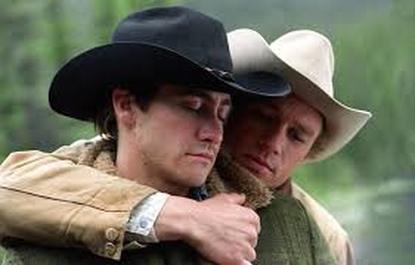(from Comicbook.com - http://comicbook.com/2015/01/22/heath-ledger-passed-away-7-years-ago-today/)
Ledger’s ultra-manly roles started before the two films he is most famous for, the ones which will be the primary focus here: Brokeback Mountain (Lee, 2005) and The Dark Knight (Nolan, 2008). In fact, his American breakout – the one which got him labeled as just another hunky young star - began the pattern. In 10 Things I Hate About You, a modernized teen adaptation of Shakespeare’s The Taming of the Shrew, Ledger plays Patrick Verona, a tough young man shrouded by cigarette smoke and crazy rumors (“I heard he ate a live duck once,” one character says to another. “Everything but the beak and feet,” the other responds) - the basic teenage delinquent archetype complete with long hair and a black leather jacket. As such, the main male characters are afraid to approach him at first, but, as both the viewers and Kat Stratford (Julia Stiles), 10 Things’ female lead, discover, he is more capable of great sensitivity than sadism – a person to trust, rather than fear.
Regardless of his career’s impact on his personal life, the imprint Ledger left on the industry is clear. No actor living and working today displays the complications of manhood in quite the same way, nor quite so well.
Works Cited
-- “Brokeback Mountain: A Screenplay.” Proulx, pp. 29-128
Nolan, Jonathan and Nolan, Christopher. “The Dark Knight.” The Dark Knight Trilogy, edited by Christopher Nolan, Jonathan Nolan, and David S. Goyer, OPUS, 2013, pp. 167-323.
Norris, Chris. “(Untitled Heath Ledger Project): Analyzing the Double Life of Heath Ledger” New York Magazine. 18 February 2008 http://nymag.com/news/features/44217/ Accessed 7 March 2017.
Philipkoski, Kristen. “Unnecessarily Dangerous Drug Combo Caused Heath Ledger’s Death.” Wired. 6 February 2008. https://www.wired.com/2008/02/accidental-over/ Accessed 3 March 2017.
Proulx, Annie, McMurtry, Larry, and Ossana, Diana, editors. Brokeback Mountain: Story to Screenplay. Scribner, 2005.
-- “Getting Movied,” McMurtry and Ossana, pp. 129-138






 RSS Feed
RSS Feed
